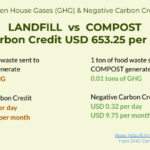Harnessing Potential: Energy Recovery from Municipal Solid Waste in Malaysia
The State of Municipal Solid Waste in Malaysia
 As Malaysia grapples with the dual challenges of waste management and energy security, the concept of energy recovery from municipal solid waste (MSW) has emerged as a promising solution. The country’s increasing population and urbanization have led to a surge in waste generation, making it imperative to explore sustainable alternatives. Energy recovery from MSW presents an innovative approach that not only addresses the waste issue but also contributes to the diversification of Malaysia’s energy mix.
As Malaysia grapples with the dual challenges of waste management and energy security, the concept of energy recovery from municipal solid waste (MSW) has emerged as a promising solution. The country’s increasing population and urbanization have led to a surge in waste generation, making it imperative to explore sustainable alternatives. Energy recovery from MSW presents an innovative approach that not only addresses the waste issue but also contributes to the diversification of Malaysia’s energy mix.
Malaysia faces a significant challenge in managing its municipal solid waste, with increasing urbanization and consumption patterns contributing to rising waste volumes. Conventional waste disposal methods, such as landfilling, pose environmental concerns, including soil and water pollution. Energy recovery from MSW provides an alternative approach, transforming waste into a valuable resource.
Waste-to-Energy Technologies
Several waste-to-energy technologies offer viable options for energy recovery from MSW. Incineration, anaerobic digestion, and gasification are among the technologies that can convert organic and combustible components of waste into energy. Each method has its advantages and considerations, making it essential to tailor the approach to local conditions and waste composition.
Environmental Benefits of Energy Recovery
By harnessing energy from municipal solid waste, Malaysia can reduce its reliance on conventional fossil fuels, mitigating greenhouse gas emissions and contributing to climate change mitigation efforts. Additionally, energy recovery minimizes the environmental impact associated with landfilling and open burning, providing a more sustainable waste management solution.
Potential for Renewable Energy Generation
Energy recovery from MSW presents a dual benefit by not only reducing environmental impact but also contributing to renewable energy generation. The recovered energy can be used to generate electricity or heat, supplementing the national energy grid and supporting Malaysia’s transition towards a more sustainable and diversified energy portfolio.
Government Initiatives and Policies
The Malaysian government plays a crucial role in promoting energy recovery from MSW through policy frameworks and incentives. Establishing clear regulations, offering financial incentives, and encouraging public-private partnerships can create an enabling environment for investment in waste-to-energy projects. A comprehensive approach that integrates waste management and energy policies is essential for the success of such initiatives.
Challenges and Solutions
Despite the potential benefits, challenges such as public perception, technology costs, and waste segregation issues must be addressed. Public awareness campaigns, targeted investments, and robust waste segregation practices can help overcome these challenges. Furthermore, continuous research and development efforts are vital to improving the efficiency and sustainability of waste-to-energy technologies.
Conclusion
Energy recovery from municipal solid waste stands as a transformative solution for Malaysia, addressing waste management challenges while contributing to the nation’s energy security goals. By embracing innovative waste-to-energy technologies and implementing supportive policies, Malaysia can pave the way for a sustainable future where waste is not merely a problem but a valuable resource for renewable energy generation.


